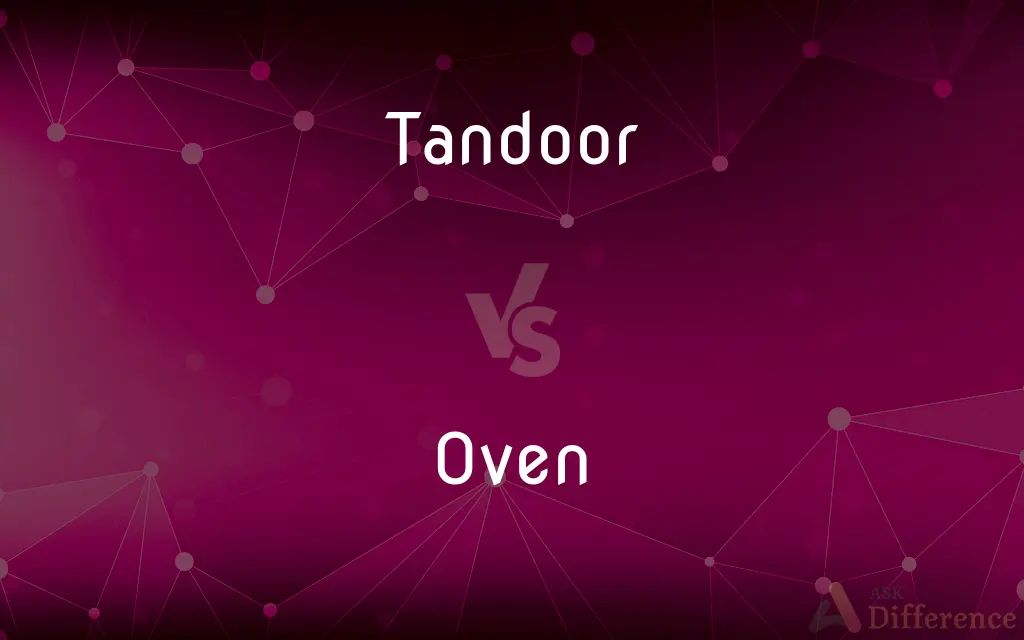Tandoor vs. Oven — What's the Difference?
By Tayyaba Rehman & Fiza Rafique — Published on October 25, 2023
A Tandoor is a cylindrical clay or metal oven used primarily in Asian cooking, while an Oven is an enclosed cooking device used globally in various cuisines.

Difference Between Tandoor and Oven
Table of Contents
ADVERTISEMENT
Key Differences
A Tandoor is a traditional cooking device, typically cylindrical in shape, made of clay or metal, primarily used in Indian, Central Asian, and Middle Eastern cuisines. In contrast, an Oven is a globally used enclosed chamber, often rectangular, that cooks food by producing heat, commonly found in household kitchens and commercial establishments.
The Tandoor operates at very high temperatures and uses charcoal or wood as its heat source, imparting a distinct smoky flavor to dishes, especially bread and meats. On the other hand, an Oven can use electric coils, gas burners, or convection methods to heat and typically offers a range of temperature settings for diverse cooking needs.
From a culinary standpoint, a Tandoor is iconic for dishes like tandoori chicken, naan bread, and kebabs, emphasizing quick, intense heat and charred exteriors. An Oven, with its versatility, facilitates baking, roasting, broiling, and more, catering to a broader range of recipes from cakes to casseroles.
In terms of design, the vertical orientation of a Tandoor means food can be hung inside or placed on the inner wall, whereas an Oven typically involves horizontal racks or trays. Both the Tandoor and the Oven have evolved over time, with modern versions offering more convenience and safety features.
Historically, the Tandoor has cultural significance in regions like India, where communal tandoors were central to village life. Meanwhile, the Oven is a staple in western culinary traditions and has seen numerous iterations, from ancient clay ovens to today's sophisticated electronic versions.
ADVERTISEMENT
Comparison Chart
Material
Typically made of clay or metal
Various materials, including metal, ceramic, and glass
Heat Source
Charcoal or wood
Electric, gas, or convection
Typical Dishes
Tandoori chicken, naan bread, kebabs
Breads, cakes, casseroles, roasts
Design
Cylindrical with vertical orientation
Rectangular with horizontal racks or trays
Cultural Significance
Central in Indian, Central Asian cuisines
Broadly used across various global cuisines
Compare with Definitions
Tandoor
Used primarily in Asian cuisines.
The chef used the Tandoor to prepare delicious kebabs.
Oven
Can be electric, gas, or convection.
Their new Oven has a convection setting for even baking.
Tandoor
A cylindrical clay cooking apparatus.
They baked the bread directly on the walls of the Tandoor.
Oven
Common in household kitchens.
They bought a new Oven with advanced features for their kitchen.
Tandoor
Achieves very high temperatures.
The Tandoor's intense heat quickly cooked the naan bread.
Oven
An enclosed chamber for cooking.
She baked the cake in the Oven for 30 minutes.
Tandoor
Cooks with direct radiant heat.
Meats hung inside the Tandoor cook evenly with radiant heat.
Oven
Used for baking, roasting, and broiling.
He set the Oven to broil to crisp the top of the casserole.
Tandoor
Imparts a smoky flavor to dishes.
Tandoori chicken gets its unique taste from the Tandoor.
Oven
Operates at variable temperatures.
The bread needs to bake at a lower Oven temperature.
Tandoor
A cylindrical oven made of clay, heated over charcoal or wood, and used in South Asia and Central Asia for baking bread and roasting meat.
Oven
A chamber or enclosed compartment for heating, baking, or roasting food, as in a stove, or for firing, baking, hardening, or drying objects, as in a kiln.
Tandoor
A cylindrical clay oven used, in the cuisine of the Caucasus, Middle East, and Indian subcontinent, to make flat bread, or to cook meat.
Oven
A chamber used for baking or heating.
Tandoor
A clay oven used in northern India and Pakistan
Oven
(colloquial) A very hot place.
Oven
To cook in an oven
Oven
A place arched over with brick or stonework, and used for baking, heating, or drying; hence, any structure, whether fixed or portable, which may be heated for baking, drying, etc.; esp., now, a chamber in a stove, used for baking or roasting.
Oven
Kitchen appliance used for baking or roasting
Common Curiosities
How does an Oven produce heat?
An Oven can produce heat through electric coils, gas burners, or convection methods.
What type of dishes is a Tandoor best known for?
A Tandoor is best known for dishes like tandoori chicken, naan bread, and various kebabs.
How does food cooked in a Tandoor taste different?
Food cooked in a Tandoor often has a distinct smoky flavor and a charred exterior.
What are the primary cooking methods for an Oven?
An Oven supports baking, roasting, broiling, and sometimes even grilling.
Why do naan breads puff up in the Tandoor?
The intense heat of the Tandoor causes rapid gas expansion in the dough, making naan bread puff up.
Is the Tandoor used outside of Asian cuisines?
While primarily associated with Asian cuisines, the Tandoor has been adopted in some Western kitchens due to its unique cooking style.
Is it safe to touch the outside of a Tandoor when it's in use?
No, the outside of a Tandoor can become extremely hot and should not be touched without protection.
Are there modern electric versions of the Tandoor?
Yes, there are modern electric versions of the Tandoor, catering to contemporary kitchens and convenience.
How do you regulate the temperature in an Oven?
Most Ovens have temperature dials or digital settings to regulate heat precisely.
Are Tandoors commonly found in household kitchens?
While Tandoors are common in certain regions, they're less frequent in Western household kitchens compared to Ovens.
Can you make pizza in an Oven?
Yes, pizzas are commonly baked in Ovens.
Can you cook cakes in a Tandoor?
While unconventional, it's possible but requires careful monitoring due to the Tandoor's intense heat.
Which is more energy-efficient: a gas Oven or an electric Oven?
Typically, gas Ovens are considered more energy-efficient than electric Ovens.
How is tandoori roti different from oven-baked roti?
Tandoori roti is cooked quickly in a Tandoor's high heat, giving it a smoky flavor, while oven-baked roti may lack that distinct char and flavor.
Is preheating an Oven necessary?
Yes, preheating an Oven ensures consistent cooking temperatures for many recipes.
Share Your Discovery

Previous Comparison
GDP vs. GPI
Next Comparison
Duloxetine vs. FluoxetineAuthor Spotlight
Written by
Tayyaba RehmanTayyaba Rehman is a distinguished writer, currently serving as a primary contributor to askdifference.com. As a researcher in semantics and etymology, Tayyaba's passion for the complexity of languages and their distinctions has found a perfect home on the platform. Tayyaba delves into the intricacies of language, distinguishing between commonly confused words and phrases, thereby providing clarity for readers worldwide.
Co-written by
Fiza RafiqueFiza Rafique is a skilled content writer at AskDifference.com, where she meticulously refines and enhances written pieces. Drawing from her vast editorial expertise, Fiza ensures clarity, accuracy, and precision in every article. Passionate about language, she continually seeks to elevate the quality of content for readers worldwide.














































